Britta Waller Melton presented the content marketing keynote address at the 2021 ASJA Writers Conference, held virtually in April. The talk, entitled “No-Stress Success: Browse, Read and Binge in 2021 to Fuel Your Creativity,” focused on how to cultivate an omnivorous media diet and how to use that to generate ideas and grow your freelance business. Melton is a group creative director at Pace (paceco.com), which is based in Greensboro, NC.
Author: Belinda Clarke
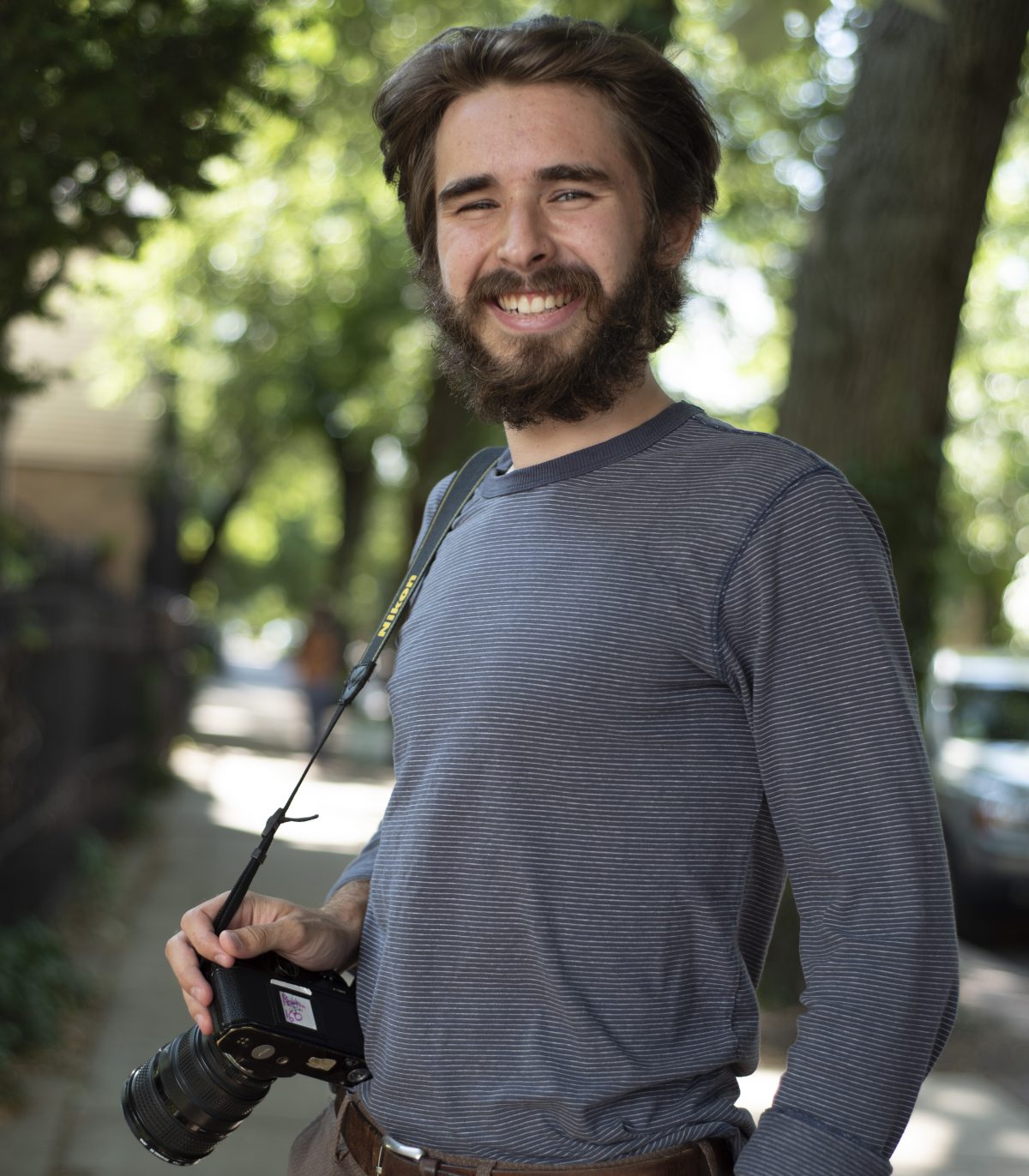
Colin Boyle was selected as a finalist for two Peter Lisagor Awards. The nominations are for Best Photography (all media) and Best Deadline Reporting (online) for his visual reporting during summer 2020 for Block Club Chicago. The winners are announced on May 14, 2021.
Susan Howe (BSJ91)
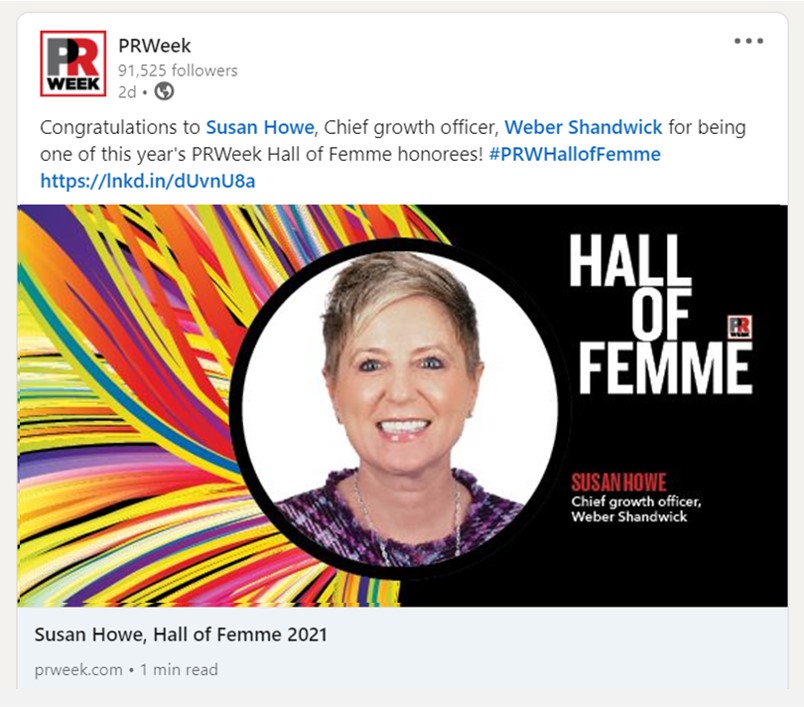
In April, Susan Howe was named to the PR Week “Hall of Femme,” along with 27 other women leaders in the public relations industry. The award recognizes female leaders who demonstrate commitment to mentorship and the advancement of women in the field. Howe is currently Chief Growth Officer at Weber Shandwick, a leading global communications agency. She serves as Chair of Northwestern’s Council of 100, a group dedicated to supporting Northwestern women in their careers.
Seven Springs: A Memoir
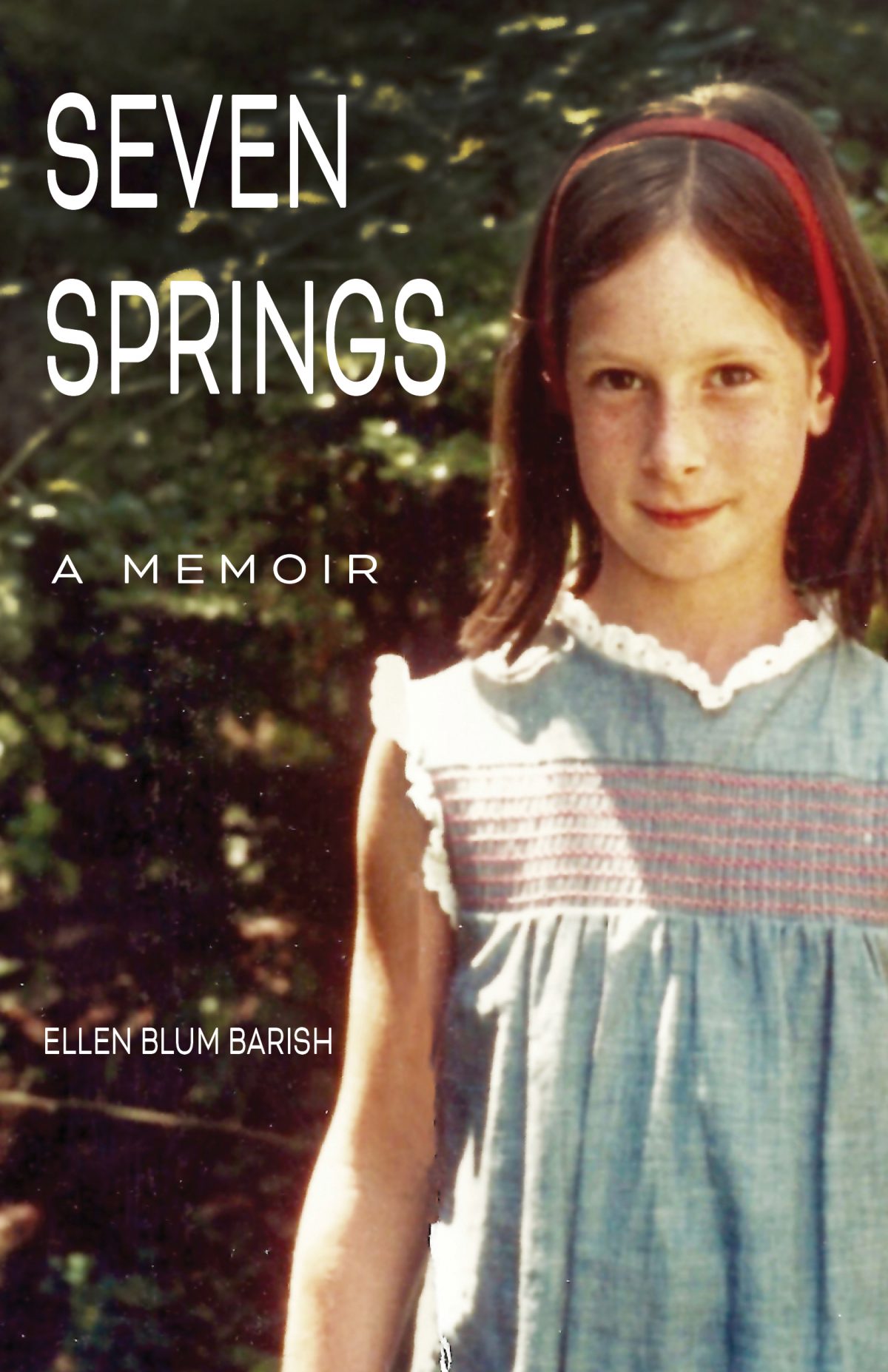
By Ellen Blum Barish (MSJ94)
One afternoon in the spring of 1972, a Mack truck sped through a residential intersection of Philadelphia and collided with a station wagon carrying a young girl and her friend on a ride home from school. The accident shattered the girl’s realities and a blanket of silence fell over them until they reconnected at their 20th high school reunion. That conversation set Ellen Blum Barish on a 20-year journey, reflected in seven springs, that reunited her to her past, her self, and what she now understands as faith.
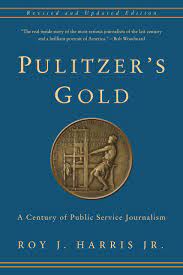
By Roy Harris (BSJ68, MSJ71)
Pulitzer’s Gold: A Century of Public Service Journalism (Columbia U. Press, 2016) tells “the real inside story of the most serious journalism of the last century,” as Bob Woodward puts it, in a way that creates “a brilliant portrait of America.” Its fascinating backstories of how Pulitzer Prize-winning stories were unearthed and produced include not only well-know cases like the Boston Globe’s Spotlight team investigation of sexual abuse by Catholic priests, and the Washington Post’s Watergate disclosures, but lesser-known exposes over 100 years of great reportiing.
The Nirvana Effect
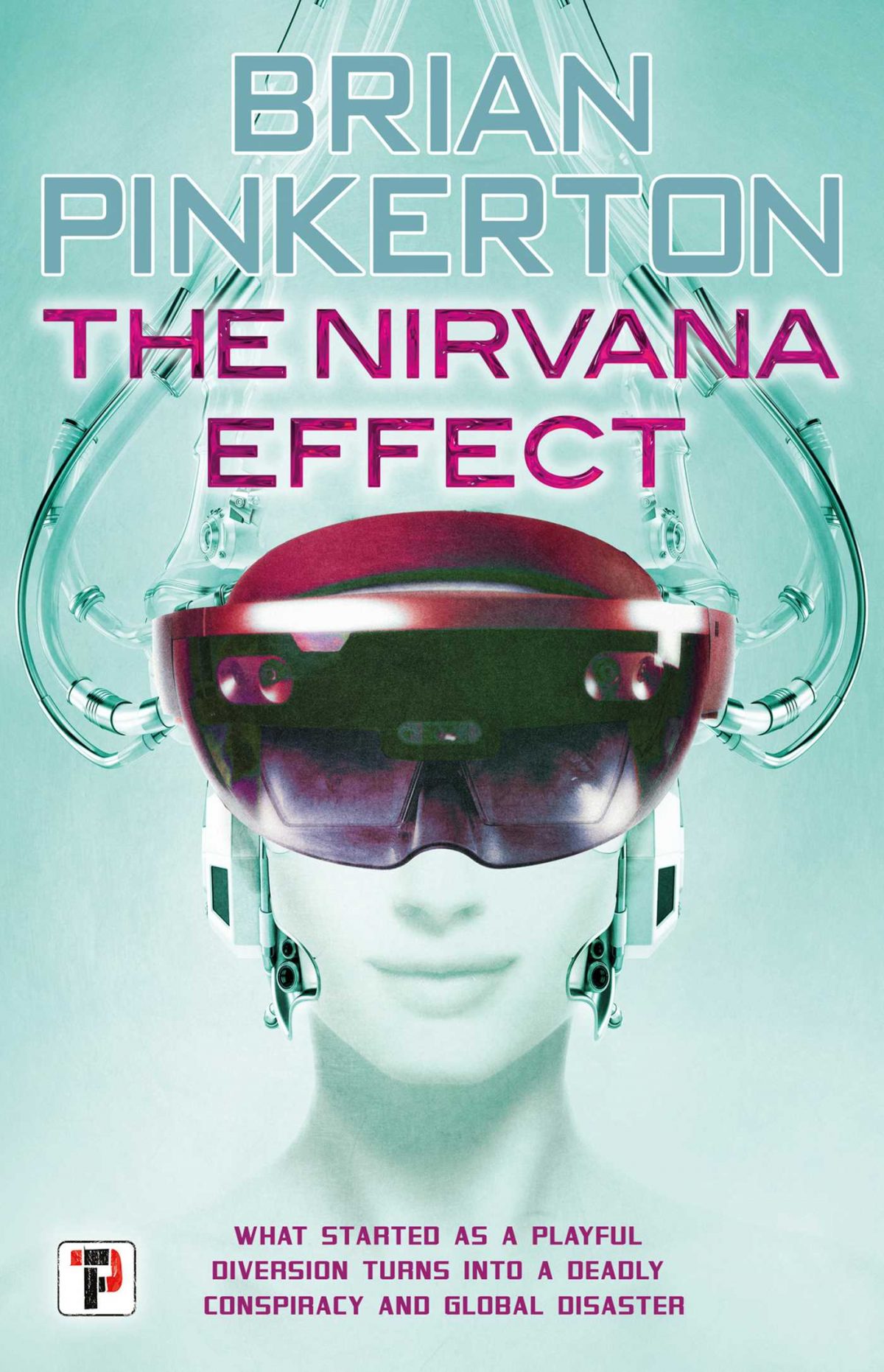
By Brian Pinkerton (MSJ89)
Society is sheltered indoors. The economy is in ruins. People spend their lives addicted to a breakthrough virtual reality technology, desperate for escapism in a troubled world. The Nirvana Effect has taken over.
Aaron and Clarissa are members of a subculture of realists who resist the lure of a fake utopia. They watch in horror as the technology spreads across the country with willing participants who easily forgo their freedoms for false pleasures. When the young couple discovers a plot to enforce compliance for mind control, the battle for free will begins. What started as a playful diversion turns deadly. The future of the human race is at stake.
The Nirvana Effect is a 2021 release from Flame Tree Press/Simon & Schuster. Brian Pinkerton is the author of 10 novels in the thriller, science-fiction and horror genres, including the USA Today bestseller Abducted. He lives in Wilmette, Illinois.
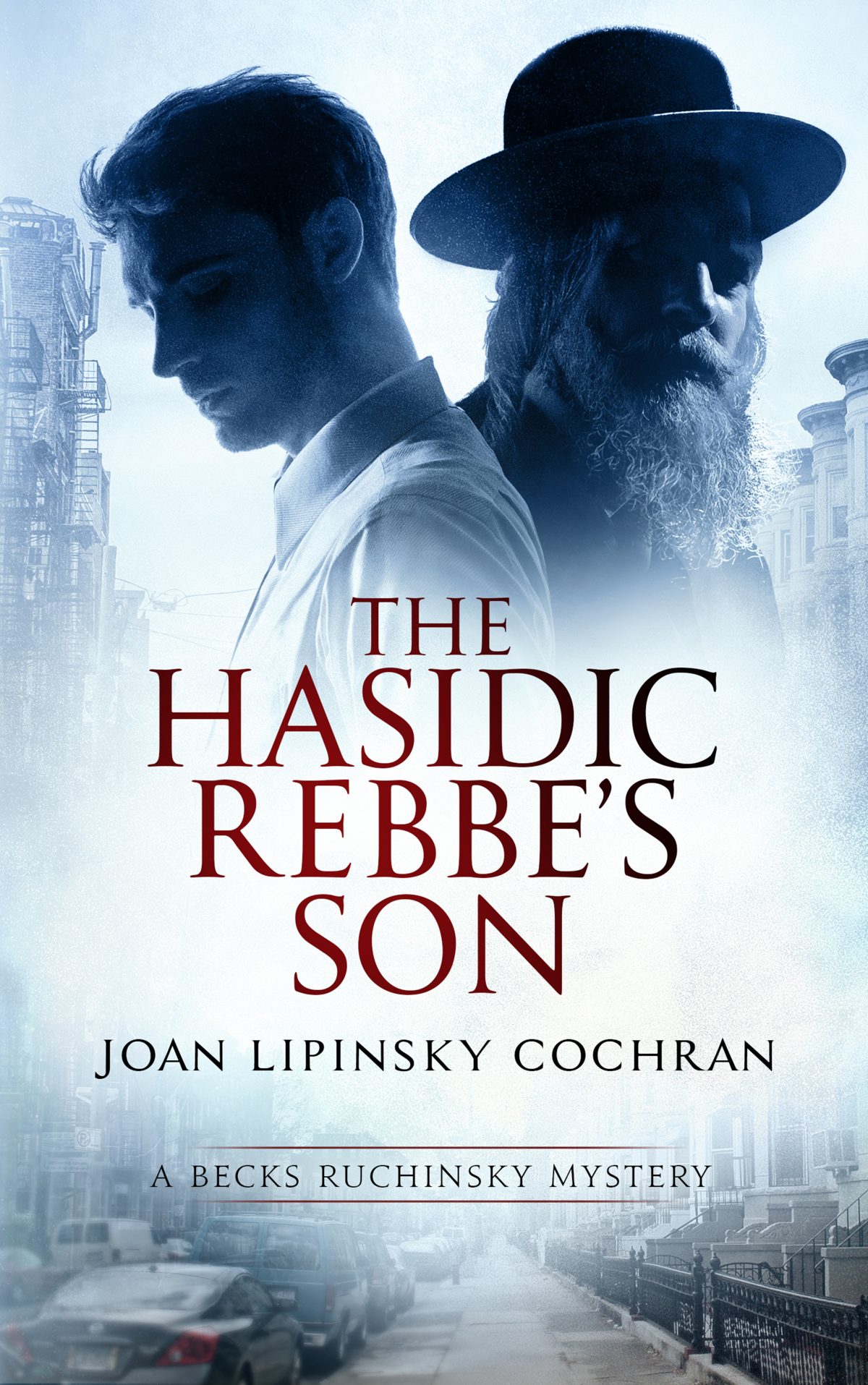
By Joan Lipinsky Cochran (BSJ75)
Boca Raton reporter Becks Ruchinsky is surprised when her son, Gabe, brings a frightened young man home from college and asks her to hide him. Menachem left his Hasidic community under mysterious circumstances and fears being kidnapped. Grateful to the young man for befriending her son, whose Asperger’s makes friendships difficult, Becks takes in the boy. Six days later, he’s found floating in a canal.
Police insist Menachem’s drowning was an accident but Becks isn’t buying. Her investigation takes her from the gritty underworld of the South Beach night club scene to secretive Hasidic communities in Miami and New York. With the help of her ex-gangster father and a nosy Hasidic shopkeeper, Becks discovers the leader of a cult-like religious community is subverting rabbinic law to conceal ugly truths. As she uncovers layer upon layer of lies and deceptions, Becks discovers her son’s life may depend on her ability to unearth these secrets.
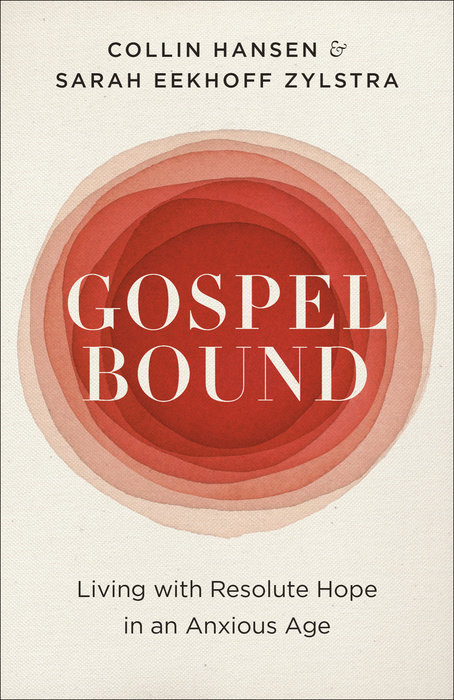
By Collin Hansen BSJ03
As the pressures of health warnings, economic turmoil, and partisan politics continue to rise, Christians aren’t widely known as living for the common good. But there’s another story unfolding too—if you know where to look. In Gospelbound: Living with Resolute Hope in an Anxious Age (Multnomah), veteran journalists Collin Hansen (BSJ ’03) and Sarah Eekhoff Zylstra (MSJ ’05) counter these growing fears with a robust message of resolute hope for anyone hungry for good news. Join these leaders from The Gospel Coalition—one of the largest religion websites in the world—in exploring profound stories of Christians who are quietly changing the world in the name of Jesus, from the wild world of digital media to the stories of ancient saints and unsung contemporary activists on the frontiers of justice and mercy. You haven’t heard the whole story. And that’s good news.
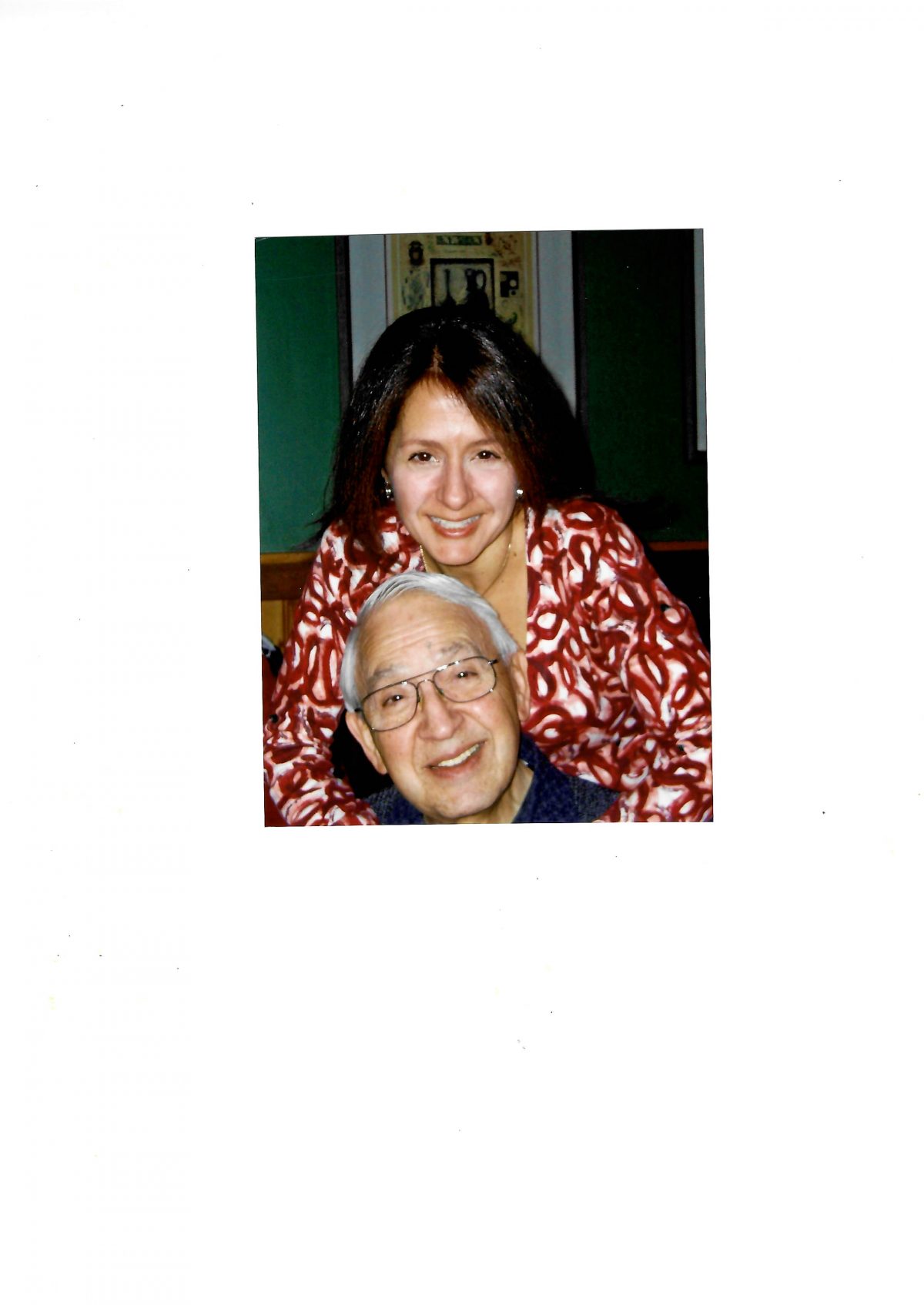
My Father was a complex man. Unlike most of us, who try to conceal our flaws, he wore them prominently and proudly on his sleeve. Who you saw was who you got.
He was a professional’s professional. In the journalism world, he was the logistics reporter for any story he covered, never wavering in the chaos. In the corporate world, he was the eye of the storm in a crisis. He never shied from making decisions and doling orders. The many accomplishments throughout his colorful career are summarized in his obituary.
Here, I will focus on, and celebrate, “Sam the Family Man”. He and my dear mother Dena provided support to four generations. As the children of immigrants, they gave to the best of their ability. They always looked for needs and tried to fill them.
My Father showed, and stepped, up in any number of ways: chief copy editor, career counselor, math tutor, 4th of July bike decorator, and letter writer on birthdays, holidays and during college years.
And then there were the fun and funny moments.
One Easter we opened what looked like a wooden toolbox, only to find a white poodle puppy, Si-Bon. When we were little, we got airplane and horseback rides or, we got carried through the house while he called out something silly.
We had the blessing of watching him do the same with his grandchildren Thomas, Effie, Marina & Dena. He loved to get down on the floor and give them horseback rides, build all kinds of architectural buildings, including the Acropolis, churches, libraries, the Arlington Race Track and whole little communities. He loved practicing golf with them on the putting mat and looked forward to the annual fishing outing at Luther Village in Arlington Heights. If my sister Laurie was in town, she had the dubious honor of preparing the hooks! He taught the grandchildren the Greek alphabet, numbers, and many words.
One of my fondest memories is Saturday mornings in Sauganash. Each Saturday, Dad would record his financial program from our den. Laurie and I would beg to come in and he would let us, provided we were quiet. Each Saturday, all it would take was one look, one mouthing of some provocatory sentence or one poke and the giggles would set in, uncontrollably. Of course, they started silent, then rumbled through our bodies until they gasped out into the air. We got a few “takes” and eventually, were dismissed. Until next Saturday. I’ve no idea how much time our shenanigans added to his process, but it sure was fun!
Another fond memory is of the Winter hockey playoffs. Dad, my brother Don and I would follow the Chicago Black Hawks. We had our own playoff on the tabletop game set up on the oversized marble coffee table in the den. It was very competitive! My parents were way ahead of their time in not limiting any one of us by gender. So, I leaned in and played my little heart out and nobody let me win. Yet, sometimes I did! As I look back, that was a great training ground for many of the corporate antics I would later encounter throughout my career. Dad supported Don’s hockey sport, which he took up. Sometimes, they would skate at the park together.
They also shared a passion for music, particularly jazz. All three of us took piano lessons, but Don was the gifted pianist. Dad put on album after album and Don could start playing the piece by ear. Mom played the piano, too. Although Dad early dabbled at the guitar, he had always wanted to learn to play piano.
Dad always took an interest in Laurie’s and my musical ventures, our church and other choral groups, Laurie’s musicals and theatrical performances, and my CD’s recorded for Roy. He also supported my artwork endeavors. Laurie and Dad enjoyed watching all kinds of sports together, and once attended the Western Open Golf tournament.
As Greeks, we were all about our food, food, food! Sunday after church meals at restaurants with our cousins and family friends. Lockwood Castle sparklers for our birthdays. Lou Malnati’s pizza. Biasetti’s hamburgers. Greek lamb wrapped in white paper at Easter, with the best feta and bread. Coffeecake for Sunday breakfast. Homemade Greek delicacies. The funniest holiday tradition was at the Thanksgiving table, which was packed with our cousins and a few of my college friends who couldn’t get home. We would take turns telling jokes just as a friend was taking a bite of the Kourabiedes…and wait for the powdered sugar to fly! Tough crowd…
Our family saw much of the U.S.A, sometimes in a Chevrolet and other cars, and by plane. Many vacations spent in Estes Park with our cousins and other family friends…California, the East Coast and others. Among our most memorable in the early ‘60’s: I was about five when we flew to New York. Our sedan rental ended up being a mustang, which barely accommodated the five of us and our luggage. It was unbelievably hot with no air conditioning. Bodies and bags filled every square inch of that sports car. It was on that trip that I developed my love of red MGs. Back in the day of non-hovercraft parents, mine let cousin Zoe and her boyfriend, Tony, “adopt” me for the week, taking me to the beach, for subs and the carnival all in…you guessed it…Tony’s red MG. We Sarans are all about our cars. Dad purchased his last one in January 2020 and drove it to pick up his Mariano’s groceries just months before his passing.
One of our most memorable family vacations almost didn’t happen. In 1984, I had tickets to join my parents in Greece, where they were celebrating their anniversary. I got the idea to have Don and Laurie come as a surprise. We hustled to make it happen. I remember Don and I scrambling downtown to get his passport. We barely made it in time for the flight, where Laurie was waiting for us. Not to sound archaic, but that pre-dated cell phones so all of this drama happened with out communication or updates! I asked my parents to meet me outside their hotel. I remember walking toward them and, just as we met, Don and Laurie casually stepped out from behind a tree into our path. They were shocked! Of course, it never occurred to us we could give one of them a heart attack!
Among my fondest memories are of watching my parents dance, which they did any chance they got. They could cut a rug with the best of them and lit up the dance floor! They would both beam as they moved in synch with ease. Now that Dad also has received his “angel” wings they’re doing a different kind of dance.
Godspeed, Dad…
Linda Saran 2021
Northwestern University B.A./M.S.C.
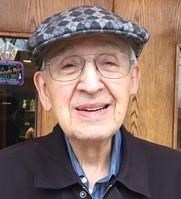
As published in the Chicago Sun-Times on Feb. 21, 2021
The world just got a little quieter. Sam H. Saran passed away at the age of 97 on Feb. 1, 2021. He began his career in journalism and remained curious about everything until the very end. He never lost the impulse to report…on everything from family doings, the weather, the logistics of any trip you might be taking, and the market to current events. Most conversations began with, “So what can you tell me today?” “Sam the family man” survived both wife Dena (Chiodras) of 48 years, with whom he had three children, and Thora (nee Clark) who passed away in September. He was loving Father to Don (Margie), Linda (Roy) and Laurie (Angelos), and beloved Papou to grandchildren Thomas, Effie, Marina and Dena.
An only child, he began supporting his parents at the age of 12. He lived in Chicago his entire life, except for 3 ½ years of service in WWII where he was inducted into the U.S. Army Air Force in World War II, and later transferred to serve as a B-29 Bombardier with the 346 th Bomb Group on Okinawa. He separated as a First Lieutenant in 1946. With the G.I. Bill, Sam completed both undergraduate and graduate degrees at Medill in 3 ½ years, while working part-time as a typesetter with the printer who gave him his first job, following graduation from Lane Technical High School in 1941.
A 40-year veteran Chicago broadcast news writer, reporter, commentator at NBC News, Sam began his career as financial news writer-editor. During his 13 years with NBC, he produced news documentaries, and delivered newscasts on local and network programs, specifically for a nightly radio stock market and business report and a weekly television series, “Invest in America”. He also served as reporter-at-large for the WMAQ series, “Night Desk”, and on numerous NBC network news assignments including the national political conventions of 1956 and 1960. In 1959, Sam wrote, produced and directed an hour-long television documentary on the first anniversary of the tragic Our Lady of Angels school fire, “It Must Never Happen Again.”
As a financial broadcaster he was cited as Man of the Year in 1960 by the Stock Brokers’ Associates, and also was cited by the Chicago Federated Advertising Club and the American Bankers Association. Among the dignitaries/celebrities Sam interviewed during his years: Senator John F. Kennedy, (TV City Desk), Maria Callas (News on the Spot), Al Capone, Mayor Richard Daley, Elizabeth Taylor and others… While a public relations executive at Northwestern University, Sam secured two major gifts to the University’s Evanston campus—the O.T. Hogan Biological Sciences Building and Nathaniel Leverone Hall in the Kellogg School of Management—from two CEO guests who appeared on his TV broadcasts.
For 22 years, he served as Director of Corporate Communications/Assistant to the CEO for Inland Steel Industries, Inc. In 1968, he was cited by Institutional Investor magazine, the leading financial analyst publication, for the best industry report for nine consecutive years, a distinction held by only three other companies. By today’s standards, Sam would have been labeled a “foodie”. Having grown up with Greek immigrant family/friend grocery merchants, one of his first jobs was stocking in a grocery store. During the Pandemic, very detailed grocery order lists were dictated and inventoried after picking them up in the car he purchased only a year ago or, later, when being delivered. We could always count on a performance review! Sam was a lover of music and a jazz aficionado, enjoying his Saturday and Sunday lunches to Big Band and other standards from the Greatest Generation era. In later years, he viewed services from Christ Church, Oak Brook, where he was where he was a member for decades. He also had a passion for golf, which he enjoyed throughout his adult life. With this, his last report is filed.